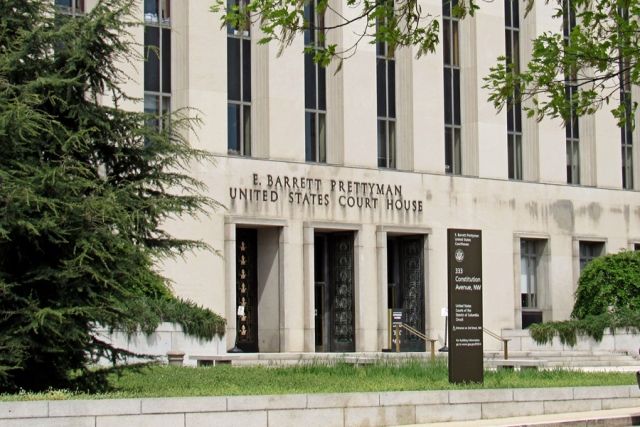
This ruling against the Glenfarne and NextDecade permits is the third instance since July in which the D.C. Court of Appeals has struck down FERC permit approvals. (Source: Shutterstock)
For the third time in two months, the U.S. Court of Appeals for the D.C. Circuit has remanded permits back to the Federal Energy Regulatory Commission (FERC), threatening the legal status of major energy projects.
On Aug. 6, the D.C. Appeals Court vacated the FERC-approved permits for Glenfarne’s Texas LNG project and NextDecade’s Rio Grande LNG projects, both located on the same shore of the Brownsville Shipping Channel in South Texas. The ruling also vacated a pipeline connected with the Rio Grande project.
“Given the nature and severity of the flaws in the Commission’s second effort to properly assess the projects, we vacate the reauthorization orders and remand to the Commission for further consideration,” the court wrote in its ruling.
This ruling against the Glenfarne and NextDecade permits is the third instance since July in which the D.C. Court of Appeals has struck down FERC permit approvals. According to the FERC website, the D.C. court is the primary jurisdiction for filing appeals to FERC decisions.
“This decision is significant in that FERC certificates being vacated is generally pretty rare,” said Tom Sharp of Arbo, a firm that monitors government regulation of the energy sector. “But three projects have met this fate in the D.C. Circuit in less than a month.”
On July 16, the court sent a permit for the Commonwealth LNG project in Louisiana back to the FERC.
On July 30, the court remanded FERC’s permit approval for Williams Cos.’ Regional Energy Access Expansion Project (REA) on the company’s Transcontinental Gas Pipeline.
The D.C. appeals court also made news in June when the Supreme Court said it would review an earlier ruling in which the appellate court struck down a FERC permit for a new railway out of the Uinta Basin.
All three of the judges on the D.C. appeals court panel were appointed by Democratic presidents.
“It’s worth noting that judges (Bradley) Garcia and (Michelle) Childs were on the panel for both the REA and Rio LNG decisions, and that Chief Judge (Sri) Srinivasan was also on the Rio LNG panel, though he did not write the opinion,” Sharp said. “This shows some internal visibility and alignment within the D.C. Circuit on the substance of the decisions, particularly because rehearing requests are likely, and they are rarely granted.”
All of the court’s rulings cite the FERC for not considering “public interest” as it relates to greenhouse-gas releases, though each case involves other criticisms as well. In the rulings, the court has demanded that the FERC consider the overall impact of a project on global warming.
The FERC responded that it is unable to adequately estimate the effect of a single project, according to government standards.
The Rio Grande LNG project is under construction and slated to begin production with three trains in 2027. The day before the appeals court ruling, NextDecade announced a $4.3 billion contract to Bechtel for the construction of the plant’s fourth train.
“NextDecade is disappointed in the Court’s decision and disagrees with its conclusions,” according to a statement the company released on its website. “At this time, construction continues on the first three liquefaction trains and related infrastructure at the Rio Grande LNG Facility, and the company is evaluating the impact of the court’s decision on the timing of a positive final investment decision (FID) on Train 4.”
One analyst predicted that the disputed permit problem would most likely be solved quickly.
“Rio Grande is still moving ahead as planned with construction, and we view this as no more than a temporary annoyance with no ultimate impact on cash flows or project timing,” an analyst for Stifel wrote following the ruling. “That said, if it were to escalate and there was a disruption to timing, it could have an impact on the returns of future cash flows and the sequencing of growth opportunities.”
A spokesperson for Texas LNG said the company believed the issue will be solved quickly.
“We are studying the opinion, which is a procedural decision to correct a technical deficiency,” the spokesperson told Hart Energy via email. “We have full confidence FERC will address this matter judiciously and efficiently and look forward to working with them on this important issue. Texas LNG is an industry-leading export facility designed to be the greenest on the planet once operational.”
During its second-quarter earnings call on Aug. 6, Williams CEO Alan Armstrong also expressed confidence that his company’s REA project would go forward.
“We believe the court's concerns about the FERC process is once again flawed and will be fairly easy for the FERC to resolve,” Williams said. “In the meantime, we are taking the necessary legal and regulatory steps to address the court's concerns and ensure that this much-needed firm transportation capacity continues to be available to serve the needs of our customers without interruptions.”
Sharp said analysts would be closely watching the legal moves over the coming weeks, as companies scramble to respond legally to the ruling.
“We’ll be watching in the short term for rehearing requests and requests to stay the D.C. Circuit’s order, all in an effort to avoid stopping construction on the Rio Grande LNG project,” he said. “We have seen the D.C. Circuit grant stays in other cases … We have also seen projects like MVP [Mountain Valley Pipeline] being forced to halt construction.”
Recommended Reading
NextDecade Plans 3 More Trains at Rio Grande LNG
2025-02-28 - Houston-based NextDecade continues to build the Rio Grande LNG Center in Brownsville, Texas, as its permits filed with the Federal Energy Regulatory Commission continue to go through the legal process.
Glenfarne CEO Expects FID on Texas LNG by End of 2025
2025-03-16 - Glenfarne Energy Transition executives are waiting on a re-issue of a vacated FERC permit for Texas LNG.
Venture Global Gets Final Approval to Fully Open Calcasieu Pass LNG
2025-04-03 - Venture Global has FERC permission to put the remaining facilities at its Calcasieu Pass LNG plant into service, placing an unknown status on arbitration hearings with its long-term customers.
Trump’s DOE Issues First LNG Permit of Term to Commonwealth LNG
2025-02-14 - The former administration of President Joe Biden had halted permitting for all of 2024.
Bottlenecks Holding US Back from NatGas, LNG Dominance
2025-03-13 - North America’s natural gas abundance positions the region to be a reliable power supplier. But regulatory factors are holding the industry back from fully tackling the global energy crisis, experts at CERAWeek said.
Comments
Add new comment
This conversation is moderated according to Hart Energy community rules. Please read the rules before joining the discussion. If you’re experiencing any technical problems, please contact our customer care team.






